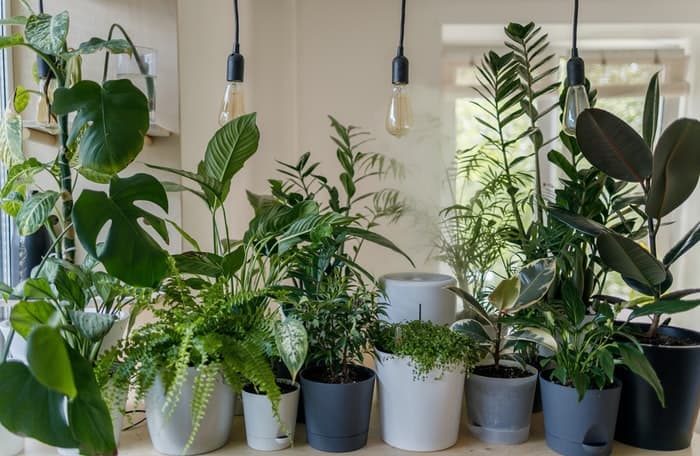House plants are often a topic of discussion when it comes to asthma. Some people believe that they can help clear the air and make the environment healthier for those with asthma. Others believe that house plants can actually worsen asthma symptoms. So, what is the truth?

To answer this question, it is important to first understand what asthma is. Asthma is a respiratory condition that causes inflammation and narrowing of the airways. This makes it difficult to breathe, which can lead to coughing, wheezing, and shortness of breath.
People with asthma should always speak to their doctor before adding any new plants into their home. That being said, there are some plants that are known to be more harmful for people with asthma than others.
Do House Plants Cause Asthma?
House plants are often touted for their air-purifying abilities, but a new study suggests that they may not be as beneficial as we thought. The study found that exposure to house plants may increase the risk of asthma in children.
The study looked at nearly 1,500 children between the ages of 6 and 12. The researchers asked the children about their exposure to both indoor and outdoor plants, as well as their parents’ history of asthma. They also measured the levels of mold and pollen in the children’s homes.
The findings showed that exposure to indoor plants was associated with an increased risk of asthma, while exposure to outdoor plants was not. The researchers said that this could be because indoor plants tend to harbor more mold and pollen than outdoor plants.
Best Asthma-Friendly Houseplants
It is said that indoor plants can improve air quality, and this is especially beneficial for people with asthma. Here are some of the best plants to consider for your home if you have asthma:
Aloe Vera
Aloe Vera is a succulent plant that is native to Africa. It has been used for thousands of years to treat a variety of medical conditions, including asthma. Aloe Vera is a good choice for a houseplant because it is easy to care for and it helps improve the air quality in your home. Aloe Vera produces oxygen at night, which can help improve your sleep quality. It also helps remove toxins from the air, including benzene and formaldehyde.
Boston Fern
Boston ferns are great for people with asthma because they improve air quality by removing toxins and pollutants from the air. They are also one of the easiest plants to care for, making them a perfect choice for busy people or those with limited gardening experience. Boston ferns are also known to help relieve asthma symptoms, making them a great choice for anyone dealing with this respiratory condition.
English Ivy
English ivy is a popular houseplant because it is easy to care for and helps improve air quality. Ivy is known to be one of the best plants for asthma sufferers because it absorbs toxins, such as formaldehyde, from the air. Additionally, English ivy also releases oxygen into the air, helping to improve air quality.
Peace Lily
Peace lilies are among the best houseplants for people with asthma. They are one of the few plants that release significant quantities of oxygen at night, which can help to improve air quality in the home. Peace lilies also filter out harmful toxins from the air, including benzene and formaldehyde. They are easy to care for and tolerate low light levels, making them a good choice for people who live in apartments or other small spaces.

What Plants Will Make Asthma Worse?
House plants can be a great way to improve air quality and add some life to a room, but for people with asthma, some plants can cause problems. Some common house plants that can trigger asthma symptoms are:
Orchids
The pollen from orchids can cause asthma to worsen because it is a potent allergen. Orchid pollen is one of the most common causes of seasonal allergies, and it can trigger asthma symptoms such as chest tightness, coughing, and wheezing. Pollen from orchids can also cause allergic rhinitis, which is a condition that causes sneezing, congestion, and a runny nose.
African Violets
The African violet is a common household plant that is known to produce high levels of pollen. For people with asthma, this can be a major problem. Pollen is known to trigger asthma attacks, and the African violet produces more pollen than most other plants. If you have asthma, it is best to avoid this plant.
Chrysanthemums
Chrysanthemums are members of the Asteraceae family and are known to cause allergic reactions in some people. Specifically, chrysanthemums can exacerbate asthma symptoms in those who suffer from the respiratory condition. The pollen from chrysanthemums is highly allergenic and can cause a narrowing of the airways, which leads to difficulty breathing.
How to Choose the Right House Plant if You Have Asthma
Asthma is a respiratory condition that can make it difficult to breathe. If you have asthma, you may want to consider choosing a house plant that will not aggravate your condition. Some plants that are known to be asthma-friendly include aloe vera, Boston ferns, and English ivy.
When choosing a house plant, it is important to consider the size of the plant and the amount of light it needs. If you have limited space or do not have a lot of natural light in your home, choose a small or low-light plant.
Be sure to also consider the air quality in your home. Some plants can help improve air quality by removing toxins from the air. Plants that are known to improve air quality include bamboo palm, spider plant, and peace lily.
Conclusion
In conclusion, while house plants may improve air quality, they may also worsen asthma symptoms in some people. If you have asthma and are considering purchasing a house plant, speak with your doctor before making a decision. They can help you determine if having a house plant is the right decision for you.









